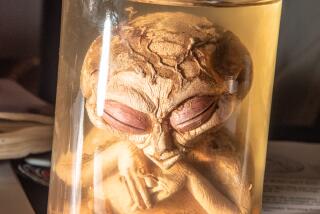Geologist Explores Faith-Science ‘Dialogue’
THOUSAND OAKS — Some drivers paste footed fish stickers on their bumpers to show they believe in Darwin’s theory of evolution. Others slap on footless fish to display their belief in Jesus and the Bible.
The battle over evolution vs. creationism takes place in science labs, churches and schools.
But if Linda Ritterbush had her way, she would design bumper stickers with a Christian fish and Darwin fish swimming side by side.
“Faith and science have a dialogue,” Ritterbush said recently in her science lab filled with rocks and fossils. Ritterbush heads the geology department at Cal Lutheran University, where she has taught paleontology, geology and environmental science for 18 years.
Theologians and scientists throughout history have often fought bitterly, especially when discussing the origins of the universe and human beings.
Theologians may feel that science undermines their faith and reduces spirituality, the world and mankind to a series of biochemical reactions. Scientists complain that theologians blind themselves to facts to suit their faith.
But Ritterbush, a Lutheran who accepts evolution, is one of a growing number of scientists who find that the two fields both have something to offer.
“There’s something each needs from the other,” said Ritterbush, whose favorite quotes on the topic come from Albert Einstein:
“Religion without science is blind.”
“Science without religion is lame.”
What religion provides is a way for scientists to approach studies: with awe, reverence and humility, Ritterbush said. In return, she said, science provides answers about the ways to best protect the planet.
One afternoon in her paleontology lab at the university, Ritterbush peered through the microscope containing a slide of single-cell fossils scraped from rocks.
Although barely the size of pencil dots, the cells appear elaborate under the lenses. One looks like a chandelier ball. One resembles a disco ball with fine silvery spines. Yet another looks like a bull’s horns.
Through her fossils, Ritterbush tries to better understand evolution. And she tries to avoid what she sees as one problem with scientists: that they sometimes become too filled with pride. Some, she said, can get to the point that they feel nature is theirs to control.
Religion, on the other hand, can help inspire awe and humility before nature, she said.
“Maybe what I find is the longer I’m at it, the more I understand the kind of pitfalls of scientific arrogance,” she said. “Technology can be intoxicating and used unwisely. If you think that nature belongs to you, you’ll use it in the way that’s best for you. I think scientists need religion to have the proper humility before nature.”
Ritterbush accepts evolution, but also believes that God had his hand in every step of life, by allowing and approving creation to take place.
But she does not agree with some anti-evolutionists, who argue that the creation of life should not be studied scientifically.
“To me, when I say the world is created, I say the Earth is the Lord’s,” Ritterbush said. “It’s all God’s world, and he has blessed it and approved it and that extends to the studying of it. . . . Through the studying of fossils, I feel some of the wonder and fascination at how life has changed.”
Ritterbush says religion has limitations: it inspires a tendency to focus more on people than on the other forms of life.
The planet cannot be saved through spirituality alone, according to Ritterbush.
“It’s easy for religious people to neglect the natural world,” she said. Yet the health of the planet depends on having knowledge about it, said Ritterbush, who makes outings to places such as the Grand Canyon, Inyo White Mountains and central coast of California to study the earth’s history.
In recent fieldwork, Ritterbush was trying to gain insights into the history of life by examining trilobites, an extinct relative of crustaceans.
Ritterbush is not alone in noting the occasional clash between religion and science. One Moorpark College philosophy instructor reported that students often get it from both sides.
“Some students say they hear from the faculty in the science class that they have to choose,” said instructor Janice Daurio, who is also an advisor for the college’s new Catholic Club. “They have to choose between religion and science. In some cases they get more pressure from religion.”
Some pastors tell the students that they aren’t Christians if they believe in evolution, she said.
Meanwhile, Ritterbush is comfortable around religion and science.
She echoes what a number of scientists and theologians are now saying--that both camps are on a quest for truth. And both work through paradox, she said. As an example, she points to the parallel some make between light and Jesus.
For a long time, scientists talked about light as being either a wave or a particle. It turns out light was both, depending on the situation. Drawing parallels from the light example, physicist F. Russel Stannard of England’s Open University suggests Jesus could have been both fully divine and human.
“These things are both paradoxes,” Ritterbush said. “We seem to learn a lot by struggling with the paradoxes, though we prefer things be neater.”
More to Read
Sign up for Essential California
The most important California stories and recommendations in your inbox every morning.
You may occasionally receive promotional content from the Los Angeles Times.










